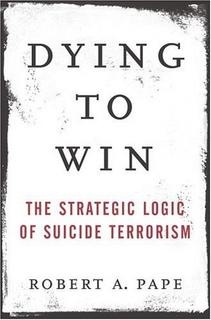 ROBERT PAPE, DELLA Università di Chicago, ha studiato tutti gli attacchi suicidi a sfondo terroristico avvenuti dal 1980 ad oggi. Ha scritto un libro al riguardo, Dying to Win: The Strategic Logic of Suicide Terrorism e soprattutto è giunto a conclusioni interessanti: fondamentalismo islamico e terrorismo suicida sono due fattori divergenti. Come racconta nell'intervista resa a The American Conservative facendo riferimento alle informazioni che ha raccolto:
ROBERT PAPE, DELLA Università di Chicago, ha studiato tutti gli attacchi suicidi a sfondo terroristico avvenuti dal 1980 ad oggi. Ha scritto un libro al riguardo, Dying to Win: The Strategic Logic of Suicide Terrorism e soprattutto è giunto a conclusioni interessanti: fondamentalismo islamico e terrorismo suicida sono due fattori divergenti. Come racconta nell'intervista resa a The American Conservative facendo riferimento alle informazioni che ha raccolto: Robert Pape: This wealth of information creates a new picture about what is motivating suicide terrorism. Islamic fundamentalism is not as closely associated with suicide terrorism as many people think. The world leader in suicide terrorism is a group that you may not be familiar with: the Tamil Tigers in Sri Lanka.
....The American Conservative: So if Islamic fundamentalism is not necessarily a key variable behind these groups, what is?
RP: The central fact is that overwhelmingly suicide-terrorist attacks are not driven by religion as much as they are by a clear strategic objective: to compel modern democracies to withdraw military forces from the territory that the terrorists view as their homeland. From Lebanon to Sri Lanka to Chechnya to Kashmir to the West Bank, every major suicide-terrorist campaign -- over 95 percent of all the incidents -- has had as its central objective to compel a democratic state to withdraw.
....TAC: If you were to break down causal factors, how much weight would you put on a cultural rejection of the West and how much weight on the presence of American troops on Muslim territory?
RP: The evidence shows that the presence of American troops is clearly the pivotal factor driving suicide terrorism.
If Islamic fundamentalism were the pivotal factor, then we should see some of the largest Islamic fundamentalist countries in the world, like Iran, which has 70 million people — three times the population of Iraq and three times the population of Saudi Arabia -- with some of the most active groups in suicide terrorism against the United States. However, there has never been an al-Qaeda suicide terrorist from Iran, and we have no evidence that there are any suicide terrorists in Iraq from Iran.
Qui su AntiWar una recensione del libro, in cui viene citato un passo degli scritti del professore:
"Rather, what nearly all suicide terrorist attacks have in common is a specific secular and strategic goal: to compel modern democracies to withdraw military forces from the territory that the terrorists consider to be their homeland. Religion is rarely the root cause, although it is often used as a tool by terrorist organizations in recruiting and in other efforts in service of the broader strategic objective."
La Guerra Fredda cominciò a terminare quando venne concettualizzata la Teoria dei giochi. Quando, cioè, si costruì un modello per interpretare comportamenti inediti ma presumibilmente razionali e assegnare loro dei significati. Il libro di Pape va oggi in quella direzione?
C'è un altro postulato implicito, come emerge dalla recensione (se serve a indicare qualcosa), e cioè questo:
In other words, America must heed John Quincy Adam's advice that disaster lurks for America in every effort it undertakes to destroy monsters abroad in order to install democracy in their place. What Adams knew based on historical study and intuition, Pape has splendidly documented with cold, hard facts.
Cioè, tradotto in termini comprensibili a tutti: il ritorno della dottrina Monroe, che Adams il giovane coniò quando era Segretario di Stato di James Monroe. Cosa dice la dottrina Monroe? L'America agli americani... e Dio per gli altri. Noi l'abbiamo conosciuta durante la Guerra Fredda, quando gli Usa si risevarono la sfera d'influenza diretta nel Sud America (Pinochet?). In realtà le interpretazioni della dottrina, nata con il quinto presidente degli Stati Uniti d'America per opera del futuro sesto presidente, sono state molte e di segno contrastante tra loro. Su tutte, il "corollario di Roosevelt, di Theodore Roosevelt, il più giovane presidente americano, che lo coniò all'inizio del Ventesimo secolo per giustificare le mire colonialiste verso il Sud e il Centro America.
Ps: una nota di colore per i nozionisti: il padre di Adams, John Adams, fu il primo vice presidente e il secondo presidente degli Stati Uniti d'America. La coppia fu la prima "dinastia" a toccare la presidenza del Paese. Ma tenetemi lontano da questo filo di pensieri, perché ho la mente fragile: un anno fa ho rischiato di comprarmi i dieci volumi della storia dei presidenti americani...)

2 commenti:
e' esattamente uno degli argomenti su cui sto studiando per un esame ...grazie mille per la segnalazione, davvero. Mi e' molto utile.
Aggiungo allora che l'accademico ha anche scritto:
"[A]n attempt to transform Muslim societies through regime change is likely to dramatically increase the threat we face. The root cause of suicide terrorism is foreign occupation and the threat that foreign military presence poses to the local community's way of life. Hence, any policy that seeks to conquer Muslim societies in order, deliberately, to transform their culture is folly. Even if our intentions are good, anti-American terrorism would likely grow, and grow rapidly."
Posta un commento